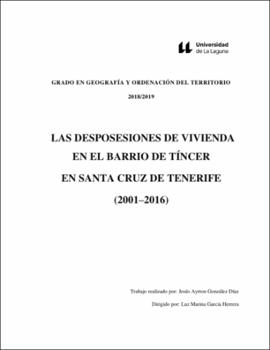Las desposesiones de vivienda en el Barrio de Tíncer en Santa Cruz de Tenerife (2001-2016)
Author
González Díaz, Jesús AyrtonDate
2019Abstract
En las últimas dos décadas tanto en Canarias como en el resto del Estado se ha pasado de un
ciclo económico alcista, basado en la especulación inmobiliario-financiera, a un periodo de
fuerte recesión socioeconómica que ha tenido entre sus efectos más graves la pérdida de la
vivienda. El presente trabajo analiza el volumen y la evolución de los desalojos entre 2001 y
2016 en Tíncer, un barrio periférico de población trabajadora de Santa Cruz de Tenerife. Los
datos socioeconómicos se han extraído del Ministerio de Fomento y los relativos a las
desposesiones de vivienda de la base de datos Atlante del Consejo General del Poder Judicial
(CGPJ). Los resultados muestran que el impacto de las desposesiones de vivienda en el barrio
de Tíncer ha sido muy superior, al registrado tanto en el distrito como en el municipio del
que forma parte. Esta mayor incidencia está relacionada con su situación de vulnerabilidad
socioeconómica agravada por la crisis. Asimismo, el estudio revela que los desahucios de
inquilinos en Tíncer superan de manera significativa a las ejecuciones hipotecarias,
constituyendo así un caso diferente respecto a la concentración de las ejecuciones
hipotecarias en los barrios más desfavorecidos señalada por los estudios existentes a escala
intraurbana. In the last two decades, both the Canary Islands and the rest of the State have gone from an
upward economic cycle, based on real estate-financial speculation, to a period of strong
socio-economic recession that has had among its most serious effects the loss of living place.
This paper analyzes the volume and evolution of evictions between 2001 and 2016 in Tíncer,
a peripheral neighborhood of the working population of Santa Cruz de Tenerife.
Socioeconomic data have been extracted from the Ministry of Public Works and those related
to housing evictions of the Atlante database of the General Council of the Judiciary (CGPJ).
The results show that the impact of housing in the neighborhood of Tíncer have been much
higher, to the registered both in the district and in the municipality of which it is a part. This
higher incidence is related to their situation of socio-economic vulnerability aggravated by the crisis. Likewise, the study reveals that the evictions of tenants in Tíncer significantly
outweigh the foreclosures, thus constituting a different case regarding the concentration of
foreclosures in the most disadvantaged neighborhoods indicated by the existing studies on
an intra-urban scale.





